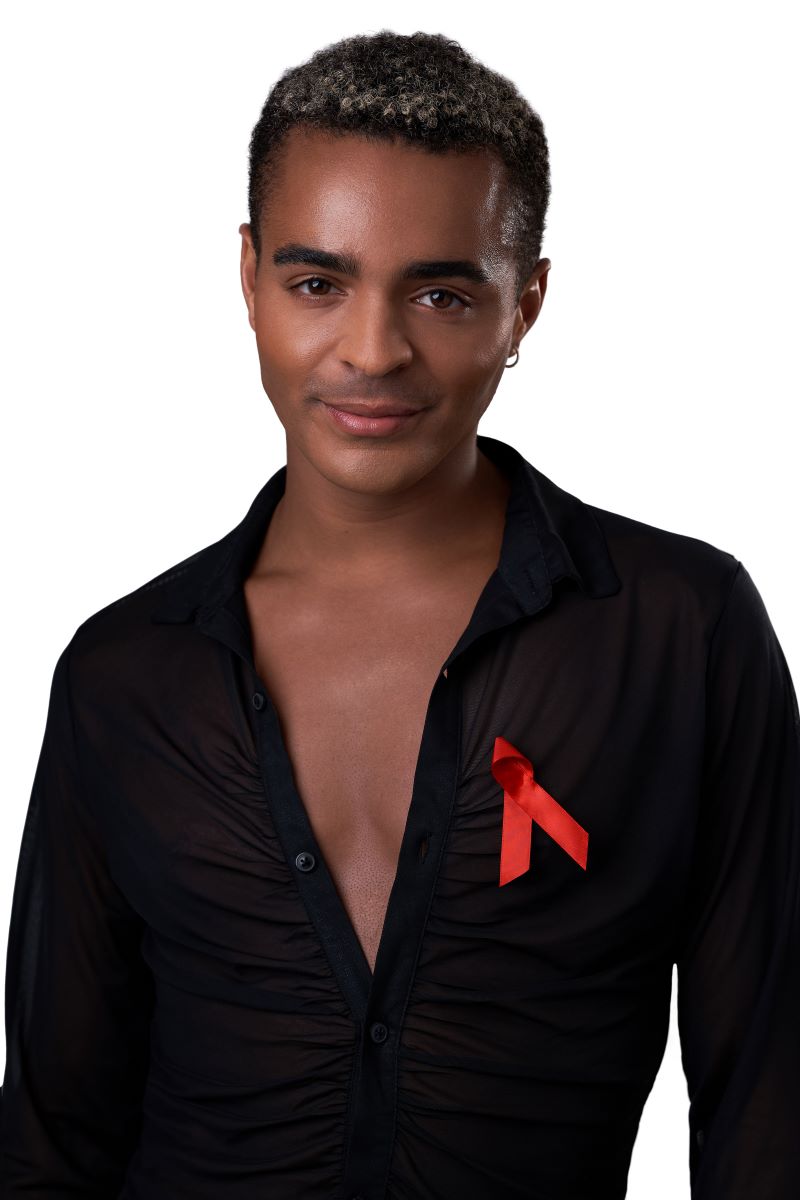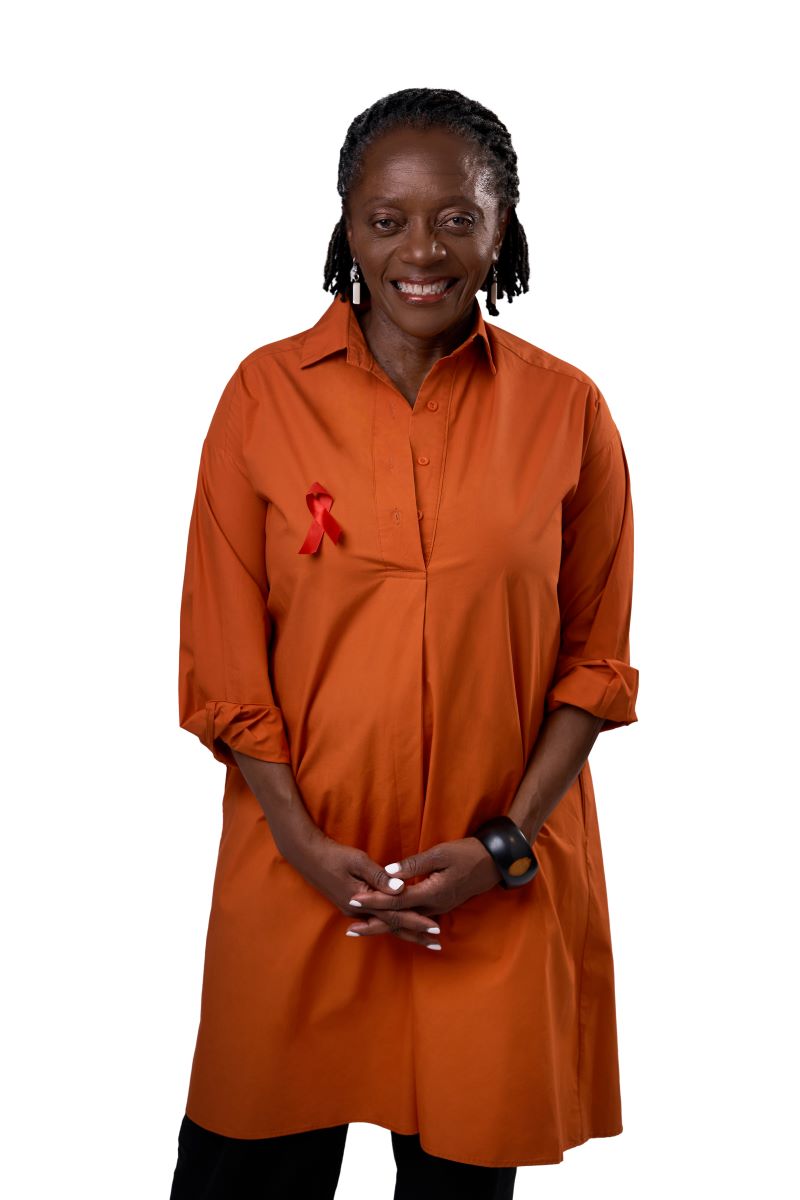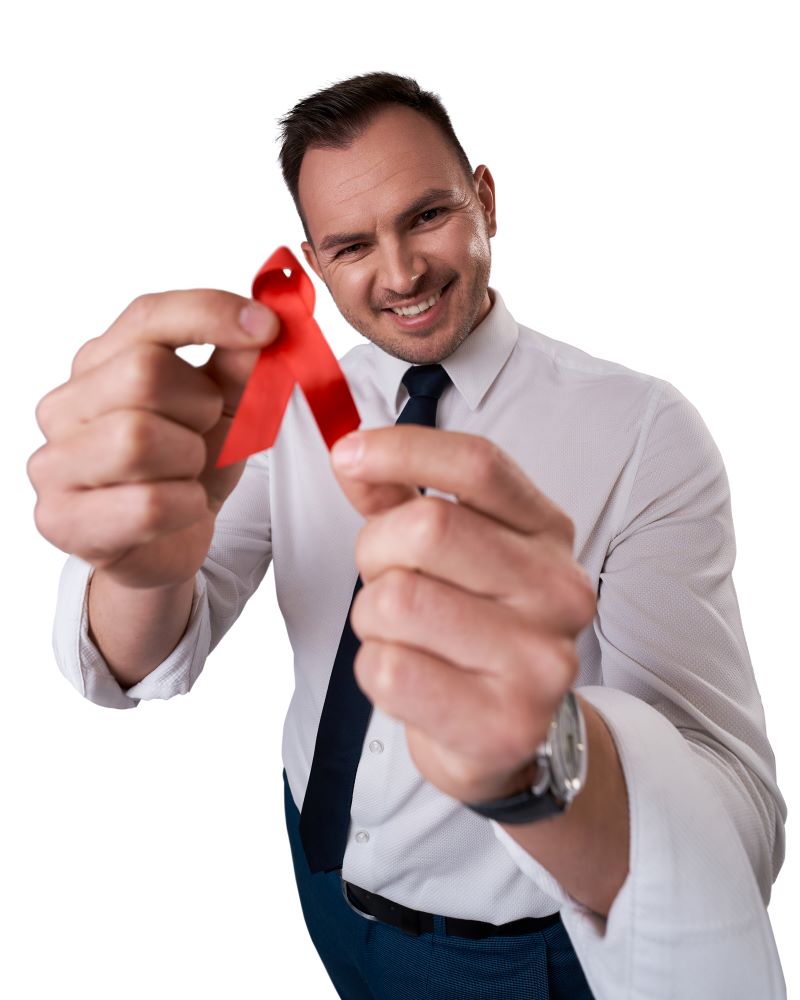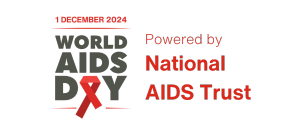Get to know Layton, Winnie, Seb, Maggie, and John
This World AIDS Day we are thrilled to introduce five individuals who are united in the aim of combatting HIV stigma. Read on to hear their stories, and how you too can join that fight.

Layton
Layton Williams, star of TV and the West End stage, is keen to join with us on World AIDS Day to help highlight the importance of combatting the stigma that is unfortunately still far too common for people living with HIV.
“I’d like to see zero stigma in the future,” he says. “That’s why I’m supporting National AIDS Trust and this campaign, which illustrates the different ways in which people can fight it.”
From wearing a red ribbon (and few people wear it better than Layton, we’d say!) to speaking out in your workplace, taking part in a challenge or sharing your own story, this year’s World AIDS Day campaign shows how everyone can play their part in eliminating stigma, and creating a fairer society for all.
“HIV is not just something that affects the LGBT+ community. It affects everyone,” Layton continues. And we need to combat stigma not only because it is outdated and unjust, but also because it acts as a barrier to getting the medical treatment and support that everyone should be entitled to.
So whether it is by encouraging people to “be invested in getting tested”, or speaking out for everyone living with HIV who is still facing the injustice of stigma, it’s great to have Layton standing alongside us this World AIDS Day.
Layton

Layton Williams, star of TV and the West End stage, is keen to join with us on World AIDS Day to help highlight the importance of combatting the stigma that is unfortunately still far too common for people living with HIV.
“I’d like to see zero stigma in the future,” he says. “That’s why I’m supporting National AIDS Trust and this campaign, which illustrates the different ways in which people can fight it.”
From wearing a red ribbon (and few people wear it better than Layton, we’d say!) to speaking out in your workplace, taking part in a challenge or sharing your own story, this year’s World AIDS Day campaign shows how everyone can play their part in eliminating stigma, and creating a fairer society for all.
“HIV is not just something that affects the LGBT+ community. It affects everyone,” Layton continues. And we need to combat stigma not only because it is outdated and unjust, but also because it acts as a barrier to getting the medical treatment and support that everyone should be entitled to.
So whether it is by encouraging people to “be invested in getting tested”, or speaking out for everyone living with HIV who is still facing the injustice of stigma, it’s great to have Layton standing alongside us this World AIDS Day.
Winnie
If Winnie looks familiar, and you’ve been a National AIDS Trust supporter for a while, then that’s because this isn’t the first time she has been one of the faces of our World AIDS Day campaigns. Back in 2004, she featured in one of the first photoshoots that we organised.
As Winnie recalls: “I remember vividly during that time, I was told it was a challenge to find people living with HIV to front the campaign, due to HIV stigma. So National AIDS Trust had to rethink the way to present it. Fashion models were hired and a few of us living with HIV were placed among the models to show that it was not possible to spot a person living with HIV just by looking at them."
“And here we are, 20 years on, still talking about HIV, and still talking about the stigma surrounding it – although this year we didn’t need to rely on fashion models!”
Winnie remains an activist. She wanted to take part in this year’s campaign because she believes “it’s important, as people living with HIV, to show our faces, to communicate that, while we still have the chronic condition, many of us on HIV treatment cannot pass on HIV to anyone else. However, new HIV transmissions are still happening, mainly due to undiagnosed or untreated HIV, and this needn't be the case”
Her advice for how we can combat stigma includes “first by starting or continuing to talk about it, within families or our social networks. It’s so important to make sure that people understand the issues, the ways that they could acquire HIV and how and how they can protect themselves.
“Stigma does a huge disservice to everyone. If people are not able to talk about their HIV diagnosis or their chronic illness, then they won’t feel able to get the help that they need.
“That’s why it is so important for us to continue to talk about it, informatively, to make sure those living with HIV are supported in the best possible ways, so that they can live to their full potential. I’m doing my bit by showing my face and saying: Here I am. This is one face of HIV, and it’s a happy face, a resilient one.”
When asked what World AIDS Day represents for her, Winnie explains that it means many different things. “We remember the millions who have died, especially the activists who helped us live; we celebrate those living with HIV and we acknowledge that there is still much more to be done to make sure everybody has access not only to effective HIV treatment, but also the support that goes alongside it.

Winnie

If Winnie looks familiar, and you’ve been a National AIDS Trust supporter for a while, then that’s because this isn’t the first time she has been one of the faces of our World AIDS Day campaigns. Back in 2004, she featured in one of the first photoshoots that we organised.
As Winnie recalls: “I remember vividly during that time, I was told it was a challenge to find people living with HIV to front the campaign, due to HIV stigma. So National AIDS Trust had to rethink the way to present it. Fashion models were hired and a few of us living with HIV were placed among the models to show that it was not possible to spot a person living with HIV just by looking at them."
“And here we are, 20 years on, still talking about HIV, and still talking about the stigma surrounding it – although this year we didn’t need to rely on fashion models!”
Winnie remains an activist. She wanted to take part in this year’s campaign because she believes “it’s important, as people living with HIV, to show our faces, to communicate that, while we still have the chronic condition, many of us on HIV treatment cannot pass on HIV to anyone else. However, new HIV transmissions are still happening, mainly due to undiagnosed or untreated HIV, and this needn't be the case”
Her advice for how we can combat stigma includes “first by starting or continuing to talk about it, within families or our social networks. It’s so important to make sure that people understand the issues, the ways that they could acquire HIV and how and how they can protect themselves.
“Stigma does a huge disservice to everyone. If people are not able to talk about their HIV diagnosis or their chronic illness, then they won’t feel able to get the help that they need.
“That’s why it is so important for us to continue to talk about it, informatively, to make sure those living with HIV are supported in the best possible ways, so that they can live to their full potential. I’m doing my bit by showing my face and saying: Here I am. This is one face of HIV, and it’s a happy face, a resilient one.”
When asked what World AIDS Day represents for her, Winnie explains that it means many different things. “We remember the millions who have died, especially the activists who helped us live; we celebrate those living with HIV and we acknowledge that there is still much more to be done to make sure everybody has access not only to effective HIV treatment, but also the support that goes alongside it.

Seb
An Executive Assistant at Amazon, where he is also an active member of their Glamazon network, Seb wants anyone to be able to go into their workplace and say “Hey, I live with HIV,” and feel confident that it is going to be completely fine. And to achieve that, he says, it is important to fight stigma, so that “people can be more open about their status and their life. They can feel more comfortable with who they are.”
He has great advice for how other people can show their support too.
“Try to be open-minded and properly listen. If someone living with HIV is comfortable enough share that experience with you, that means a lot. Be open, and don’t be afraid to ask questions.”
Seb will be marking this World AIDS Day by fundraising and helping to raise awareness of the different ways that everyone can join together to fight misunderstanding and stigma. But while celebrating, he will also be thinking about the lives of those that we have lost to the epidemic.
“It’s a good reminder,” he adds, “that we have to look after ourselves, take care of ourselves and keep fighting.”
Seb

An Executive Assistant at Amazon, where he is also an active member of their Glamazon network, Seb wants anyone to be able to go into their workplace and say “Hey, I live with HIV,” and feel confident that it is going to be completely fine. And to achieve that, he says, it is important to fight stigma, so that “people can be more open about their status and their life. They can feel more comfortable with who they are.”
He has great advice for how other people can show their support too.
“Try to be open-minded and properly listen. If someone living with HIV is comfortable enough share that experience with you, that means a lot. Be open, and don’t be afraid to ask questions.”
Seb will be marking this World AIDS Day by fundraising and helping to raise awareness of the different ways that everyone can join together to fight misunderstanding and stigma. But while celebrating, he will also be thinking about the lives of those that we have lost to the epidemic.
“It’s a good reminder,” he adds, “that we have to look after ourselves, take care of ourselves and keep fighting.”
Maggie
Twenty five-year-old medical student Maggie has been driven to advocate for people living with HIV since sadly losing her biological parents at a very young age to AIDS.
Originally from Malawi, Maggie witnessed how children in her home country were often “pushed to the outskirts of society” due to the impact of HIV on their families and she feels “fortunate” that her aunt and uncle adopted and raised her. Having witnessed the prejudice surrounding HIV when they first arrived in the UK, her adoptive parents made efforts to shield Maggie from similar challenges. As she grew older, Maggie became increasingly aware of how stigma affects people living with HIV in the UK, inspiring her to become an HIV advocate.
Because of this, Maggie is determined to tackle discrimination, and raise awareness for the fight for equal rights for people living with HIV. As well as acting as a Student Ambassador for National AIDS Trust, she has set up an HIV and Pathology society at her Uni, organising a recent talk attended by over 100 students; organising a bake sale, with cakes, red ribbons and information galore on the work of NAT for her fellow students; and most recently, completed her first ever half marathon to raise vital funds for our campaigning work.
Maggie says: “I think it’s really important to share stories and experiences. That’s how you break down barriers. Because people living with HIV are more than their status. They’re deserving of love and respect, and they have hopes and dreams like any of us. Their status doesn’t define them.”

Maggie

Twenty five-year-old medical student Maggie has been driven to advocate for people living with HIV since sadly losing her biological parents at a very young age to AIDS.
Originally from Malawi, Maggie witnessed how children in her home country were often “pushed to the outskirts of society” due to the impact of HIV on their families and she feels “fortunate” that her aunt and uncle adopted and raised her. Having witnessed the prejudice surrounding HIV when they first arrived in the UK, her adoptive parents made efforts to shield Maggie from similar challenges. As she grew older, Maggie became increasingly aware of how stigma affects people living with HIV in the UK, inspiring her to become an HIV advocate.
Because of this, Maggie is determined to tackle discrimination, and raise awareness for the fight for equal rights for people living with HIV. As well as acting as a Student Ambassador for National AIDS Trust, she has set up an HIV and Pathology society at her Uni, organising a recent talk attended by over 100 students; organising a bake sale, with cakes, red ribbons and information galore on the work of NAT for her fellow students; and most recently, completed her first ever half marathon to raise vital funds for our campaigning work.
Maggie says: “I think it’s really important to share stories and experiences. That’s how you break down barriers. Because people living with HIV are more than their status. They’re deserving of love and respect, and they have hopes and dreams like any of us. Their status doesn’t define them.”

John
John is an HIV activist who works tirelessly with the community, with a particular interest in developing and improving engagement with healthcare professionals. Always looking to find ways to use his and others’ experiences, his primary focus is on supporting everyone to live better with HIV.
Determined to do everything he can to combat stigma, John says: “In the past, I didn’t at first appreciate how much stigma had impacted on me. The ability to be open, out, and be able to communicate with everybody, without being afraid to talk about HIV – to normalise conversations and challenge those old myths – has been incredibly empowering for me.
“If people whose knowledge of HIV dates back to the 1980s, now get diagnosed, that will have a major impact on them – their mental health and potentially on their physical health. Often there will be a late diagnosis and they’ll be afraid to go and talk to anyone.
“So it’s really really important that we turn that on its head. I want to share the empowerment that I now feel, with other people living with HIV. It’s important that we normalise conversations around HIV, and sex in general: that’s when we’ll get rid of the stigma.”
And what does World AIDS Day itself signify to John?
“It’s very special. It’s an occasion to be really thankful for the fantastic progress that we’ve made over the last 40+ years, but equally, it’s really really important to remember all of my friends, and everybody’s friends – those special people who fought so hard, but who are no longer here, whose lives were cut short. So it’s a time to remember and reflect, but also to be thankful for how far we’ve come on this journey – a very important journey that is still ongoing.”
John’s advice to anyone else who wants to join the fight against HIV stigma is simple: “Whenever you hear stigmatising language, challenge it. And don’t be afraid!”
John

John is an HIV activist who works tirelessly with the community, with a particular interest in developing and improving engagement with healthcare professionals. Always looking to find ways to use his and others’ experiences, his primary focus is on supporting everyone to live better with HIV.
Determined to do everything he can to combat stigma, John says: “In the past, I didn’t at first appreciate how much stigma had impacted on me. The ability to be open, out, and be able to communicate with everybody, without being afraid to talk about HIV – to normalise conversations and challenge those old myths – has been incredibly empowering for me.
“If people whose knowledge of HIV dates back to the 1980s, now get diagnosed, that will have a major impact on them – their mental health and potentially on their physical health. Often there will be a late diagnosis and they’ll be afraid to go and talk to anyone.
“So it’s really really important that we turn that on its head. I want to share the empowerment that I now feel, with other people living with HIV. It’s important that we normalise conversations around HIV, and sex in general: that’s when we’ll get rid of the stigma.”
And what does World AIDS Day itself signify to John?
“It’s very special. It’s an occasion to be really thankful for the fantastic progress that we’ve made over the last 40+ years, but equally, it’s really really important to remember all of my friends, and everybody’s friends – those special people who fought so hard, but who are no longer here, whose lives were cut short. So it’s a time to remember and reflect, but also to be thankful for how far we’ve come on this journey – a very important journey that is still ongoing.”
John’s advice to anyone else who wants to join the fight against HIV stigma is simple: “Whenever you hear stigmatising language, challenge it. And don’t be afraid!”

